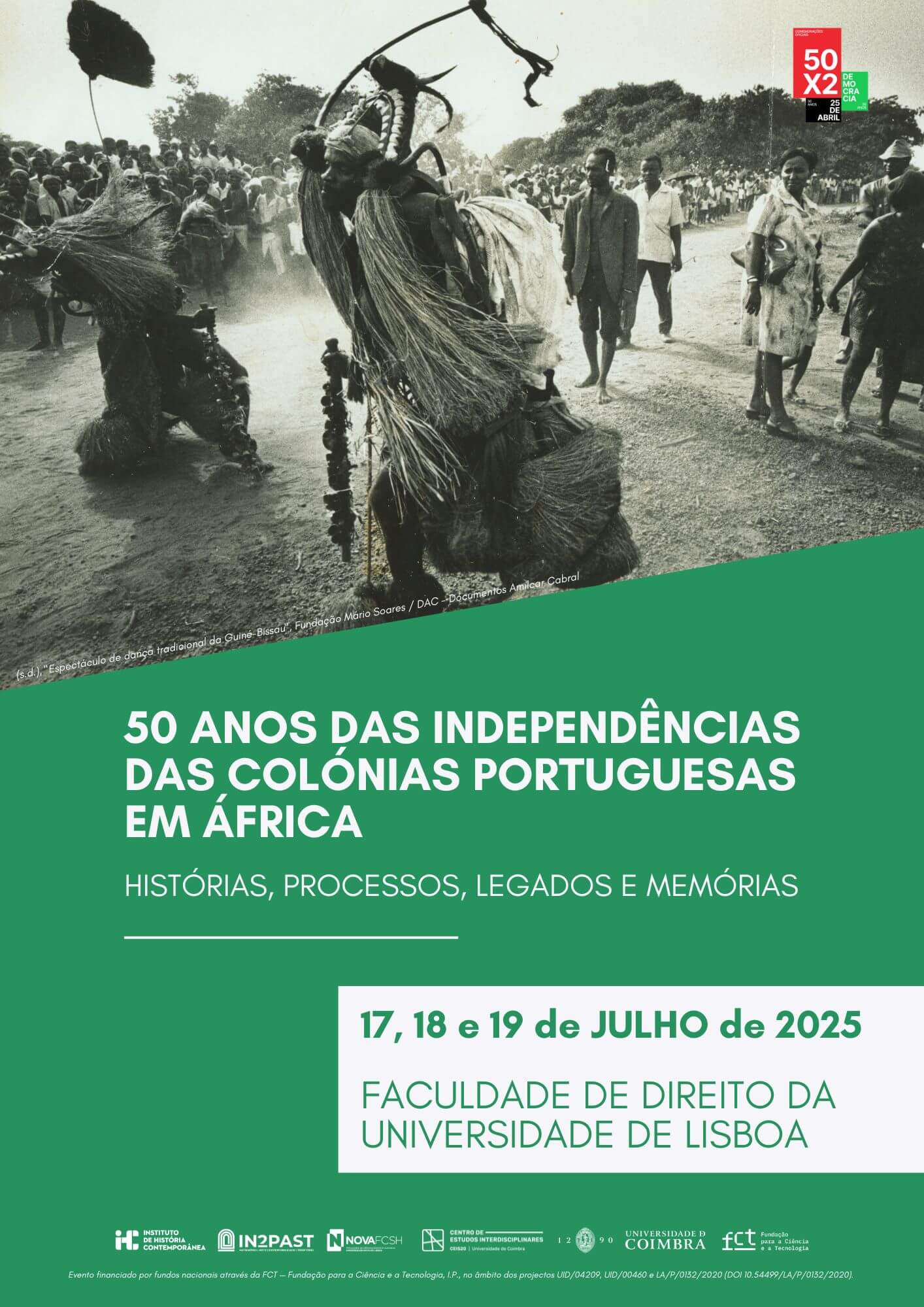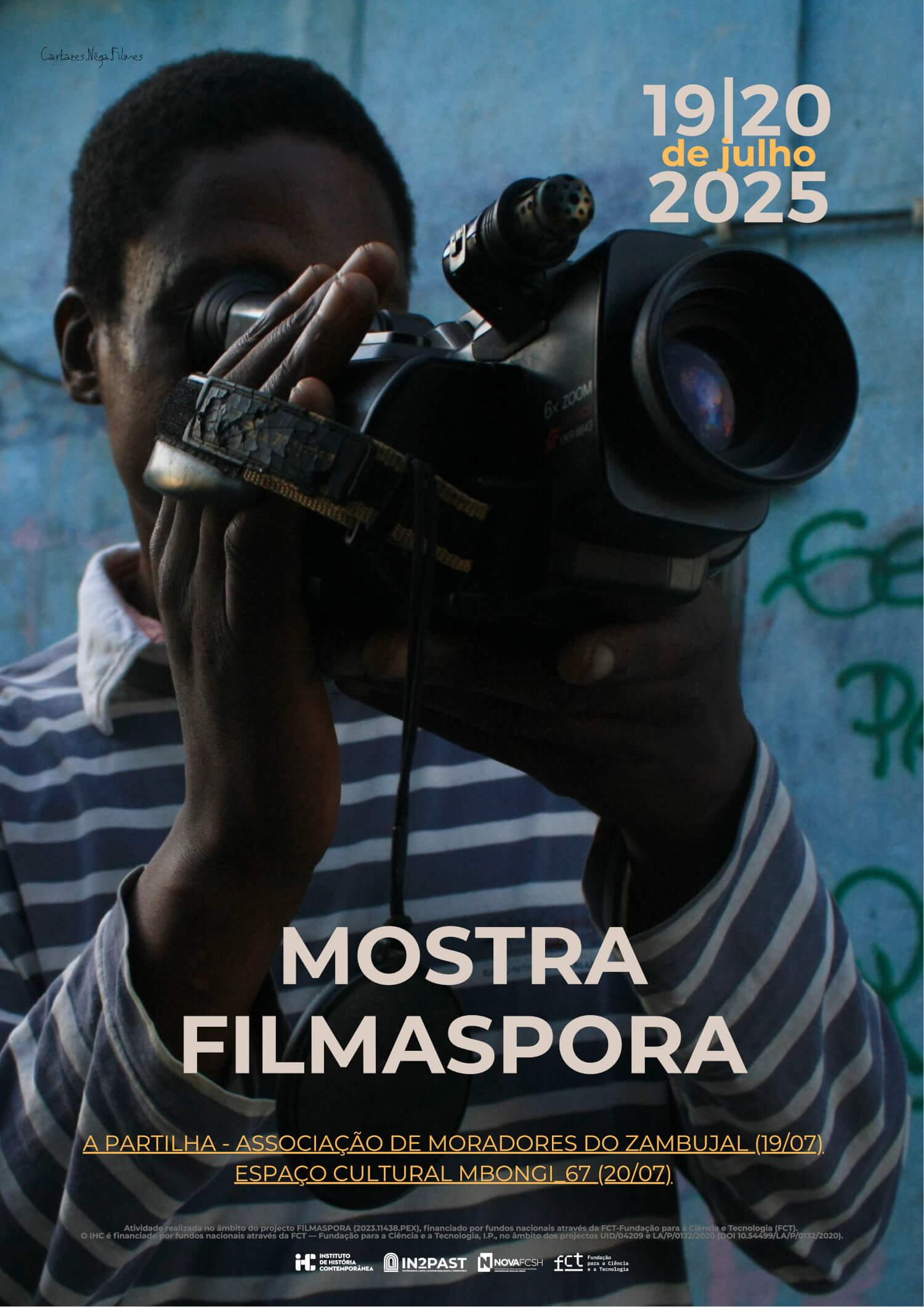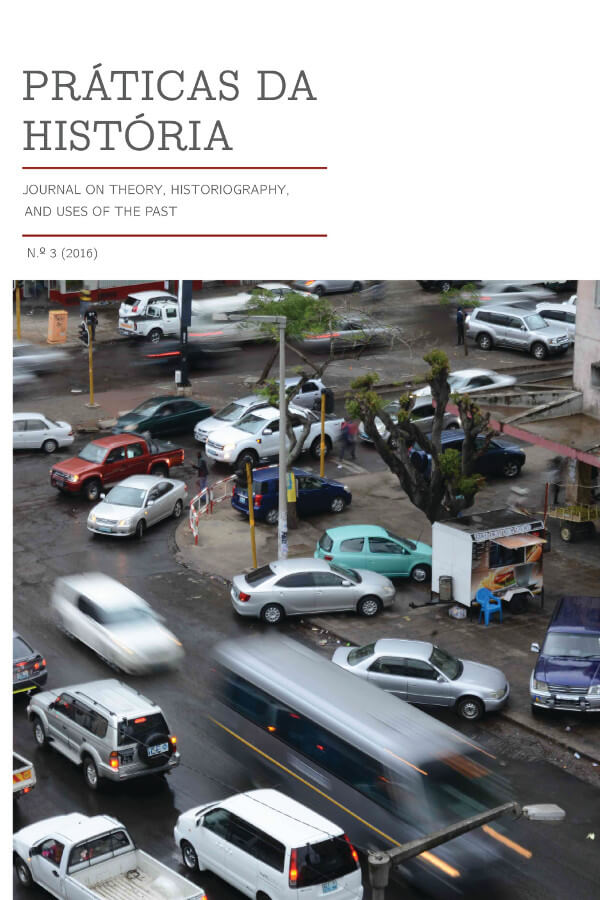
Práticas da História No. 3
Mar 7, 2018 | 2016, Editions, Práticas da História

Práticas da História – Journal on Theory, Historiography and Uses of the Past
- 2016
- Issue 3
- ISSN: 2183-590X
- Thematic dossier: “The archive and the subaltern” — Edited by Carolien Stolte and António da Silva Rego
Editorial:
This special issue takes inspiration from a series of events surrounding Dipesh Chakrabarty’s visit to Leiden University in October 2015. Especially thought-provoking was the Faculty Roundtable entitled ‘Minor Archives, Meta Histories: Rethinking Peripheries in the Age of Global Assemblages’. Together with Nira Wickramasinghe, Ksenia Robbe, Wayne Modest, and Ethan Mark, Chakrabarty discussed the potential of the ‘minor mode’: scholarship that seeks to give voice to the marginalized, foregrounds history’s ‘unlikely subjects’ and critiques the larger historiographical frames that rendered them invisible in the first place. Questions that drove the roundtable were how we might use micro-voices, -histories, and –archives to articulate different conceptions of the global and of global history; how they might help to imagine a post-national historiography in the Global South; but also where we might look for the appropriate sources for such histories. In other words: what is the archive of the minor?
A full transcript of the roundtable is included with this issue, in which the speakers touch on issues ranging from the interpretation of Australian Aboriginal songs, to discursive power imbalances within the Global South, to the ways in which scaling up – even to the planetary level – can still be considered part of the ‘minor mode’. Making this roundtable available to the wider public was an initiative of António da Silva Rêgo. From that starting point we developed the idea of a dedicated special issue, for which we recruited reflections on the nature of the archive and the possible sources for writing subaltern history.
In the first research article, ‘Travellers in Archives, or the Possibilities of a Post-Post-Archival Historiography’, Benjamin Zachariah shows what the historical profession stands to gain from a more active conception of the archive. It is time, he argues, to recover from the ‘post-archival’ condition, first contracted by historians in the wake of the postmodernist interventions of the 1970s and, more pertinent to this special issue, Ranajit Guha’s influential intervention in Subaltern Studies II [Ranajit Guha, “The Prose of Counter-Insurgency,” in Selected Subaltern Studies, ed. Ranajit Guha and Gayatri Spivak, (New Dehli: Oxford University Press, 1988 [1983]), 45-85]. The archive was generalized into a state-created collection of documents, meant to reinforce the state’s own legitimacy. With the colonial archive, in this view, the statist perspective was further exacerbated. As Zachariah notes, the colonial archive was seen as a ‘repository of prejudice’, reflecting colonial viewpoints rather than historical reality. Any effort to be attentive to the way the colonial archive was constructed, to read sources critically or to compensate for the biases inherent in the archive, was doomed to failure: Guha concluded his essay by stating that even historians seeking to write from the subaltern’s point of view are distanced from colonial discourse ‘only by a declaration of sentiment’ [Ranajit Guha, “The Prose of Counter-Insurgency,” in Selected Subaltern Studies, ed. Ranajit Guha and Gayatri Spivak, (New Dehli: Oxford University Press, 1988 [1983]), 84].
Zachariah calls upon historians to join a recent historiographical trend that, while maintaining a critical perspective on the archive, can overcome some of the limiting aspects of Guha’s view of it: by seeing the archive not as a place, but as a rhetorical move – a set of sources collected and combined by the historian, driven by his or her research questions. For archivally-minded historians his conclusions will be cause for optimism: ‘the singular control over history and memory attributed to ‘the’ archive has never existed. We invent an archive every time we have a question to answer; and then someone reinvents the archive in the service of a new question.’
Next, Dale Luis Menezes questions Indian nationalist discourses in Portuguese India, and the sources we need to consider these discourses critically. ‘Christians and Spices: a Critical Reflection on Indian Nationalist Discourses in Portuguese India’ illuminates the unique colonial trajectory that set Portuguese India apart from British India, and the way this has shaped a postcolonial trajectory for the region that likewise sets it apart from the Indian nationalist mainstream. Examining debates in the Konkani language press, in pamphlets and in other political writings, he problematizes the widespread understanding of the Portuguese period as one of spiritual and cultural destruction, as well as its mirror image: the problematic ways in which the region was discursively ‘made’ into an integral part of the Indian nation.
With Ruy Llera Blanes’ article, our discussion stays within the realm of archives and their representation of subaltern interests and perspectives. His contribution, too, is ultimately optimistic when it comes to archival potential, but like our other contributors, he locates this potential outside the archives of the state. In ‘A Febre do Arquivo. O “efeito Benjamin” e as revoluções angolanas’ (Archival Fever. The “Benjamin effect” and the Angolan Revolutions’), Blanes discusses the crucial importance of the archive in understanding recent political upheavals in Angola. Taking his cue from Derrida’s concept of archive fever [Jacques Derrida, Archive Fever. A Freudian Impression [first published as Mal d’Archive: Une Impression Freudienne] (Chicago: University of Chicago Press, 1995)], he argues that Angola’s contemporary political dialectic produces a distance between hegemonic and subaltern interests in confrontation. Blanes analyzes the archive of the so-called Revu movement as a subaltern archive, and elucidates the processes through which it poses an epistemological alternative to the official narrative of the Angolan regime. This includes rendering ‘invisible chronologies’ of protest and repression visible, and the ‘recovery’ of lost memory: it offers a rereading of the history of Angola as an independent country.
Orazio Irrera concludes the research section with an article entitled ‘De l’archéologie du savoir aux archives coloniales. L’archive comme dispositif colonial de violence épistémique’ (On the Archaeology of Knowledge in Colonial Archives. The Archive as a Colonial Device of Epistemic Violence). Irrera problematizes the archive as a place of production of truth at the intersection of its epistemological
and juridico-political matrices, in order to show to what extent the archive reflects European modernity and its colonial expansion. With Benjamin Zachariah above, he notes that recent projects, both documentary and artistic, have made the archive into an object of derision, the device of an alternative history or counter-memory. Irrera argues, however, that the force of subversion revealed by these projects cannot be understood without grasping the specific type of violence that once accompanied the establishment of the archives. Referring to strategies of objectification, surveillance, and control, he shows how the archive is linked to the proces of extracting and registering knowledge. Analyzing the archive’s direct relationship to such forms of epistemic violence, he focuses on two different aspects: ‘gestures of silence’, which create discernable absences in the colonial archive, and the ways in which the colonial archive testifies to an anguish linked to discrepancies between colonial intent, and practice on the ground.
Ranging from India to Angola and from the Goan vernacular press to records of the colonial state, each contribution to this issue takes forward questions around the archive and the minor mode. Fittingly, the issue is completed by an in-depth interview with Sanjay Seth, known for his thoughtful interventions on the theory and practice of writing history, conducted by José Neves.
Carolien Stolte (Leiden University)
Other publications
Search
Events
julho, 2025
Tipologia do Evento:
Todos
Todos
Colloquium
Conference
Conference
Congress
Course
Cycle
Debate
Exhibition
Launch
Lecture
Meeting
Movie session
Open calls
Opening
Other
Presentation
Round table
Seminar
Showcase
Symposium
Tour
Workshop
- Event Name
seg
ter
qua
qui
sex
sab
dom
-
1
2
3
4
5
6
7
8
9
10
11
12
13
14
15
16
17
18
19
20
21
22
23
24
25
26
27
28
29
30
31
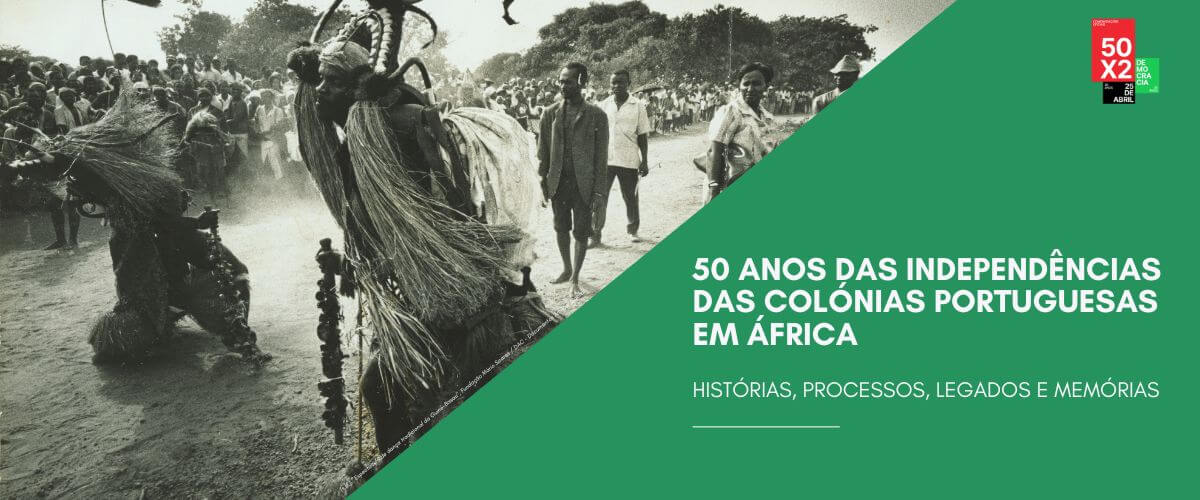
Detalhes do Evento
On the multiple dimensions – histories, processes, actions, memories and postcolonial legacies – of these independences that changed the configuration of global politics in the second half of the 20th
Ver mais
Detalhes do Evento
On the multiple dimensions – histories, processes, actions, memories and postcolonial legacies – of these independences that changed the configuration of global politics in the second half of the 20th century.
50 Years of the Independence of Portuguese Colonies in Africa:
Processes, Legacies and Memories
In 2025, four former Portuguese colonies in Africa (Angola, Cape Verde, Mozambique, São Tomé and Príncipe) will celebrate the 50 th anniversary of their independence, joining Guinea-Bissau which, two years earlier (in September 1973), had unilaterally proclaimed the state of Guinea, formally accessing independence on September 10, 1974. In fact, the complex negotiation processes that opened the door to independence of these territories that had been dominated by Portugal for centuries were not straightforward. Thus, from the Unilateral Declaration of Independence of Guinea (an important precedent at international level) to the opening of negotiation processes in the cases of Angola, Cape Verde, Mozambique and São Tomé and Príncipe complex and important geopolitical and transnational webs were established, in the African and global context of the Cold War and the aftermath of the Sino-Soviet split, which are worth analysing.
The aim of this International Conference is to mark the 50 th anniversary of these transcendental events for the lives of African territories once colonized by Portugal, some of whom (Guinea-Bissau, Angola and Mozambique) endured devastating liberation wars/colonial wars. These struggles for emancipation are part of a long history of resistance by the peoples subjected to imperial exploitation, forced labour, racism and colonialism. As it is well known, the processes that led to independence generated multiple dynamics and ramifications which, on the one hand, went beyond the main borders of each territory; on the other, produced internal and external interactions, with various elements and constraints, combining the international context of the time with internal demands for political sovereignty by the colonized peoples.
In this sense, independence should not be interpreted as an isolated historical event, nor as a linear and homogeneous event. There is a specific historicity that characterizes independence processes in each of the territories, processes that are marked by several and diverse complexities. So much so that we cannot separate independence from the struggles of the liberation movements, anti-colonialism, the revolutions in the Third World, anti-imperialism and the struggle against dictatorship and fascism in Portugal. In short, independence resulted from various struggles carried out by the liberation movements on different fronts. Their actions also contributed to the Revolution of April 25, 1974, and, consequently, to the fall of the fascist dictatorship in Portugal.
Call for Papers
After 50 years of these historical events that led to the emergence of new nation-states, this international conference aims to reflect on the multiple dimensions – histories, processes, actions, memories and postcolonial legacies – of these independences that changed the configuration of global politics in the second half of the 20th century. As such, proposals are invited for contributions on topics such as:
- Independence struggles (concepts, political, cultural and social contexts);
- Independence struggles, anti-colonialism, anti-imperialism and Third World revolutions;
- International solidarity with the former Portuguese colonies and intersections with other anticolonial struggles in the context of the Cold War;
- Actors, activists and independentist organizations;
- Gender, education and popular mobilization in the struggles for independence;
- Arts, artivism and cultural manifestations in the struggles for independence;
- Contribution from independence struggles to the fall of Portuguese dictatorship;
- Decolonization after 25 April 1974;
- Building new African nation-states and neo-colonialism;
- Colonial legacies in independent African countries and Portugal;
- Civil wars and democratic transition in independent African countries;
- The construction of memory in independent African countries and Portugal.
Abstracts for presentations (200 words) and a biographical note (250 words) should be sent to the following email: independencias50anos@gmail.com
Deadline for submissions: 15 December 2024
Notification of acceptance: 30 January 2025
Conference languages: Portuguese, English and French
>> Download the call for papers (PT / FR / EN, PDF) <<
Keynote speakers:
Maria da Conceição Neto (Universidade Agostinho Neto)
Severino Elias Ngoenha (Universidade Eduardo Mondlane)
Organisingg Committee:
Aurora Almada e Santos (IHC — NOVA FCSH / IN2PAST)
Julião Soares Sousa (CEIS 20 — Universidade de Coimbra)
Raquel Ribeiro (IHC — NOVA FCSH / IN2PAST)
Víctor Barros (IHC — NOVA FCSH / IN2PAST)
Scientific Committee:
Gabriel Fernandes (Universidade de Santiago)
Jean Martial Arséne Mbah (Investigador, Doutorado em História Contemporânea)
Jean-Michel Mabeko-Tali (Howard University)
Marçal de Menezes Paredes (Pontifícia Universidade Católica do Rio Grande do Sul)
Maria Nazaré de Ceita (Universidade de São Tomé)
Michel Cahen (Sciences Po Bordeaux)
Miguel Cardina (Universidade de Coimbra)
Odete Semedo (Instituto Nacional de Estudos e Pesquisa, Guiné-Bissau)
Pedro Aires Oliveira (IHC — NOVA FCSH / IN2PAST)
Teresa Cruz e Silva (Universidade Eduardo Mondlane)
Tempo
julho 17 (Quinta-feira) - 19 (Sábado)
Localização
University of Lisbon School of Law
Alameda da Universidade — Cidade Universitária — 1649-014 Lisbon
Organizador
Institute of Contemporary History — NOVA School of Social Sciences and Humanities and CEIS20 - Centre for Interdisciplinary Studies — University of Coimbra
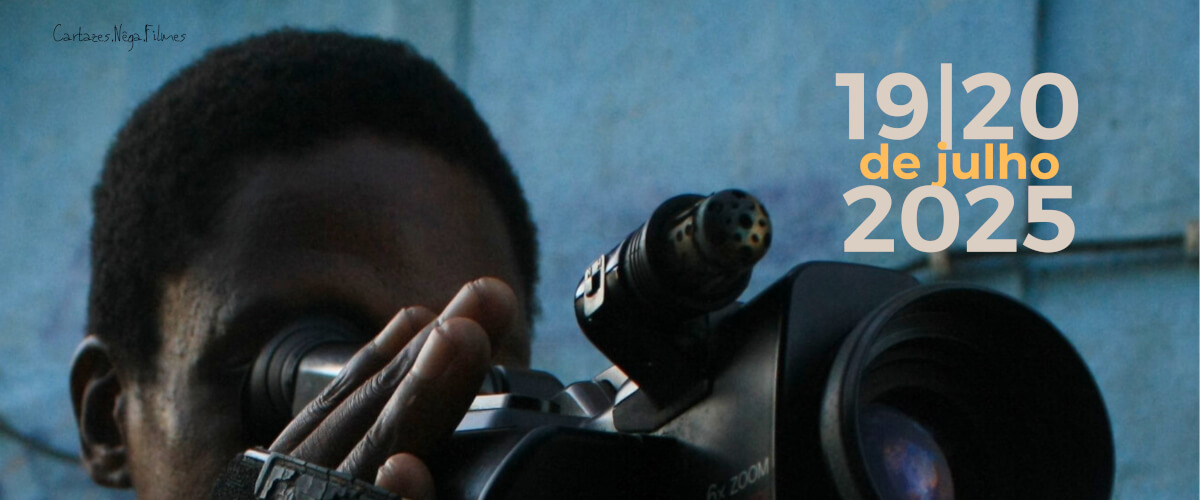
Detalhes do Evento
A film exhibition organised by the FILMASPORA project, which promotes an encounter between productions arising from the Sintra area and works made in the Bairro do
Ver mais
Detalhes do Evento
A film exhibition organised by the FILMASPORA project, which promotes an encounter between productions arising from the Sintra area and works made in the Bairro do Zambujal.
Mostra FILMASPORA
Nos dias 19 e 20 de Julho, a equipa do projecto FILMASPORA organiza uma mostra de filmes que promove o encontro entre produções da Linha de Sintra e obras realizadas no Bairro do Zambujal.
Junte-se a nós para dois dias de diálogo, partilha e cinema.
O projeto FILMASPORA tem como objectivo fomentar o intercâmbio cultural e audiovisual, aproximando comunidades através da exibição de curtas e médias-metragens que dão voz às vivências, expressões e narrativas locais.
Programa
19 de Julho
A Partilha — Associação de Moradores do Bairro do Zambujal, Loures, 21h
21h – HIP-HOP KRIOLO
21h30 – Enciclopédia Hip Hop Volume 1 (2016), de Uncle C
20 de Julho
Espaço Mbongi 67, Linha de Sintra, 16h
16h – Lisboa, Pódio de Quimeras (2021), de Welket bungué
16h30 – Cantores do Submundo (2012), de Fernando Moreira
>> Programa da mostra (PDF) <<
Tempo
19 (Sábado) 9:00 pm - 20 (Domingo) 6:00 pm
Localização
Loures and Sintra
Organizador
Institute of Contemporary History — NOVA School of Social Sciences and Humanitiescomunicacao.ihc@fcsh.unl.pt Avenida de Berna, 26C - 1069-061 Lisbon
News
Fourth edition of the Amílcar Cabral Prize
Jul 17, 2025
Applications are open until 30 September
RESONANCE project studies performance in the revolutionary period
Jul 16, 2025
RESONANCE is coordinated by Hélia Marçal
Manuel Loff receives Porto’s Medal of Merit
Jul 14, 2025
He was one of the personalities honoured by Porto City Council
CONTACTS
WORKING HOURS


































































































































